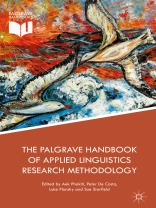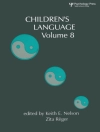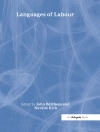This Handbook provides a comprehensive treatment of basic and more advanced research methodologies in applied linguistics and offers a state-of-the-art review of methods particular to various domains within the field. Arranged thematically in 4 parts, across 41 chapters, it covers a range of research approaches, presents current perspectives, and addresses key issues in different research methods, such as designing and implementing research instruments and techniques, and analysing different types of applied linguistics data. Innovations, challenges and trends in applied linguistics research are examined throughout the Handbook. As such it offers an up-to-date and highly accessible entry point into both established and emerging approaches that will offer fresh possibilities and perspectives as well as thorough consideration of best practices. This wide-ranging volume will prove an invaluable resource to applied linguists at all levels, including scholars in related fields such aslanguage learning and teaching, multilingualism, corpus linguistics, critical discourse analysis, discourse analysis and pragmatics, language assessment, language policy and planning, multimodal communication, and translation.
Table of Content
Part I: Research Approaches and Methodology.- Chapter 1: Applied Linguistics Research: Current issues, methods and trends; Aek Phakiti, Peter De Costa, Luke Plonsky and Sue Starfield.- Chapter 2: Habits of Mind: How Do We Know What We Know?; Richard Young.- Chapter 3: Quantitative Methodology; Luke Fryer, Jenifer Larson-Hall, and Jeffrey Stewart.- Chapter 4: Qualitative Methodology; Shim Lew, Anna Her Yang and Linda Harklau.- Chapter 5: Mixed Methodology; Alison Mackey and Lara Bryfonski.- Chapter 6: Literature Review and Research Synthesis; Shaofeng Li and Hong Wang.- Chapter 7: Research Replication; Rebekha Abbuhl.- Chapter 8: Ethical Applied Linguistics Research; Scott Sterling and Peter De Costa.- Chapter 9: Writing a Research Proposal; Sue Starfield.- Chapter 10: Writing a Research Article; Betty Samraj.- Part II: Research methods and data collection techniques.- Chapter 11: Interviews and Focus Groups; Matthew Prior.- Chapter 12: Observation and Fieldnotes; Fiona Copland.- Chapter 13: Online Questionnaires; Jean-Marc Dewaele.- Chapter 14: Psycholinguistics Methods; Sarah Grey and Kaitlyn M. Tagarelli.- Chapter 15: SLA Elicitation Tasks; Susan Gass.- Chapter 16: Introspective Verbal Reports: Think-alouds and Stimulated Recall; Melissa Bowles.- Chapter 17: Corpus Research Methods for Language Teaching and Learning; Magali Paquot.- Chapter 18: Digital Discourses Research and Methods; Christoph A. Hafner.- Part III: Data Analysis.- Chapter 19: Analysis of Association; Reza Norouzian and Luke Plonsky.- Chapter 20: Exploratory Factor Analysis; Aek Phakiti.- Chapter 21: Confirmatory Factor Analysis and Structural Equation Modeling; Aek Phakiti.- Chapter 22: Analysis of Group Differences; Luke Wander Amoroso.- Chapter 23: Statistics for Distribution-free Data; Jesse Egbert and Geoffrey T. La Flair.- Chapter 24: Reliability Analysis; Kirby Grabowski and Saerhim Oh.- Chapter 25: Analysis of Spoken and Written Discourse; Scott Crossley and Kristopher Kyle.- Chapter 26: Narrative Analysis; Phil Benson.- Chapter 27: Interactional Analysis; Elizabeth Miller.- Chapter 28: Multimodal Analysis; Jesse Pirini, Tui Matelau and Sigrid Norris.- Part IV: Selected Research Topics and Areas in Applied Linguistics.- Chapter 29: Instructed Second Language Acquisition; Shawn Loewen.- Chapter 30: Bilingualism and Multilingualism; Tej Bhatia.- Chapter 31: Forensic Linguistics; Samuel Larner.- Chapter 32: World Englishes; Peter De Costa, Jeffery Maloney and Dustin Crowther.- Chapter 33: Heritage, Community, and Indigenous Languages; Shereen Bhalla and Terrence Wiley.- Chapter 34: Translation and Interpreting; Claudia Angelelli.- Chapter 35: Identity; Ron Darvin.- Chapter 36: Gestures; Gale Stam and Kimberly Buescher.- Chapter 37: Language Planning and Policy; David Johnson and Crissa Stephens.- Chapter 38: Second Language Pragmatics; Soo Jung Youn.- Chapter 39: Language Testing and Assessment; April Ginther and Kyle Mc Intosh.- Chapter 40: Linguistic Landscape; David Malinowksi.- Chapter 41: Academic Literacies; David Bloome, Gilcinei Carvalho and Sanghee Ryu.
About the author
Aek Phakiti is an associate professor in TESOL at The University of Sydney, Australia.
Peter De Costa is an assistant professor in the Department of Linguistics and Languages at Michigan State University, USA.
Luke Plonsky is an associate professor of Applied Linguistics at Northern Arizona University, USA.
Sue Starfield is a professor in the School of Education at The University of New South Wales, Australia.












